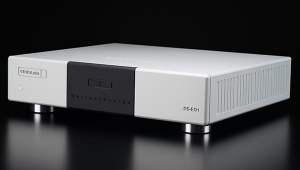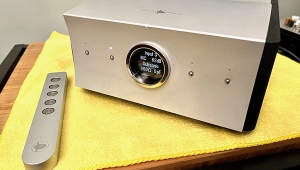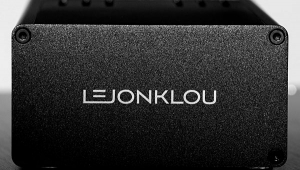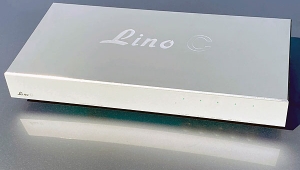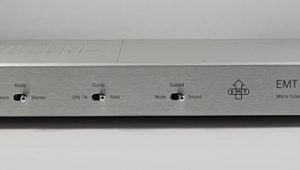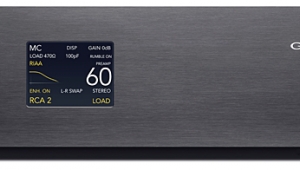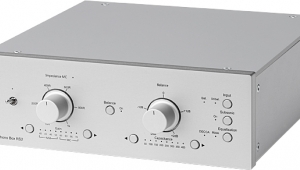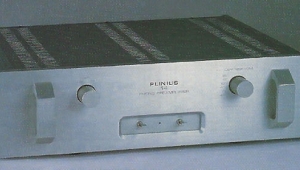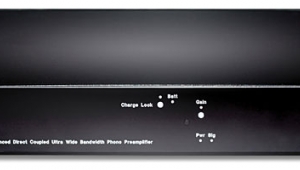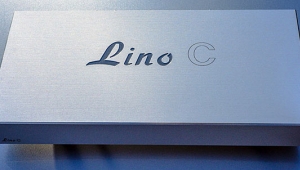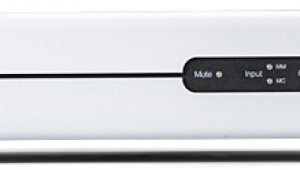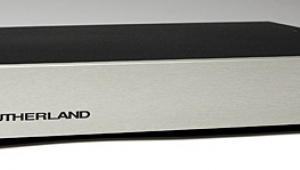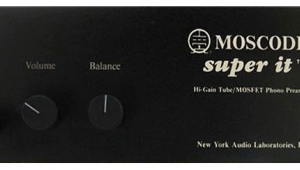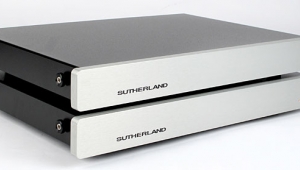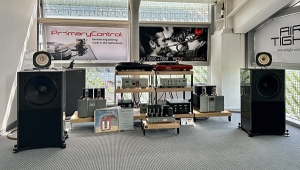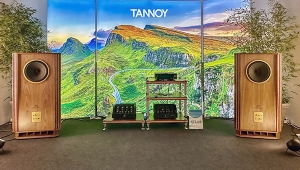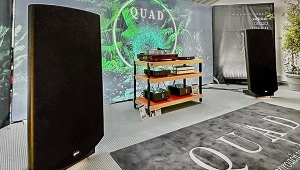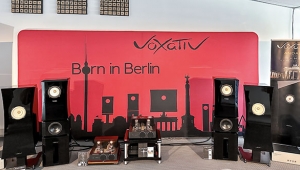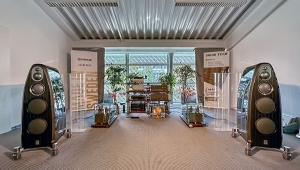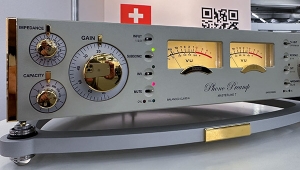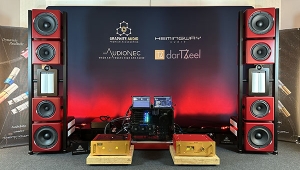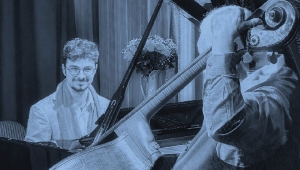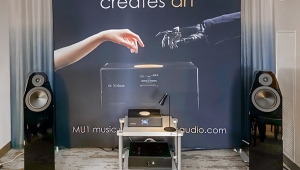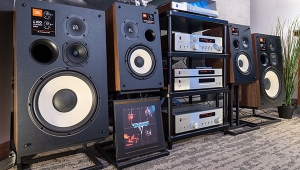| Columns Retired Columns & Blogs |
Whest PhonoStage.20 phono preamplifier
Like the $29,000 Boulder 2008 phono preamplifier, the new Whest PhonoStage.20 with its MsU.20 power supply costs as much as a car. Fortunately for you, that car happens to be my first new Saab, which cost exactly $2737 back in 1972. The solid-state Whest costs $2595, so it's a few hundred dollars cheaper. But at only a tenth the cost, it comes closer to the Boulder 2008's performance than it has any right to. That it's good enough to be mentioned in the same paragraph should tell you something about how good I think it is. Nor did it come to me hyped by the manufacturer—it took me by surprise from the minute I first heard it. I began my listening right away, before reading anything about the circuit design.
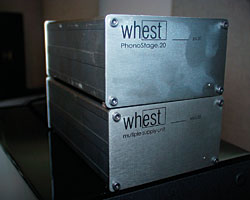 The PhonoStage.20 + MsU.20, designed and built in the UK, consists of two compact, attractively finished, nonferrous boxes of extruded aluminum—one containing the MsU.20 power supply, the other the PS.20 phono preamp and equalizer—connected via an umbilical with multipin terminations. The multiple regulated power supply has a custom transformer and 300 times the current capabilities required by the phono stage, according to designer James Henriot, who feels that the extra headroom is audibly beneficial.
The PhonoStage.20 + MsU.20, designed and built in the UK, consists of two compact, attractively finished, nonferrous boxes of extruded aluminum—one containing the MsU.20 power supply, the other the PS.20 phono preamp and equalizer—connected via an umbilical with multipin terminations. The multiple regulated power supply has a custom transformer and 300 times the current capabilities required by the phono stage, according to designer James Henriot, who feels that the extra headroom is audibly beneficial.
The dual-mono PS.20 features ultra-low-noise, multiregulation circuits that are claimed to allow the use of the lowest-output moving-coil cartridges without risk of noise. The input stage is claimed to have ultrawide bandwidth of 1Hz–130kHz, ±0.05dB, for reproduction up to 50kHz, which Henriot claims modern cutting heads and matrix processing are capable of etching into LP grooves. "Useable" playback response, according to the designer, goes down to 16Hz, which makes sense since the last thing you want to do is amplify rumble, warp/wow and the arm/cartridge system's resonant frequency! The RIAA filter, also designed to express frequencies up to 50kHz, is said to be accurate to ±0.2dB.
A discrete output stage is used instead of an integrated circuit because, among other reasons, Henriot claims current and headroom are required to accurately reproduce soundstaging, image solidity, and overall speed. The output stage uses discrete devices usually used in the driver stages of modern power amps, and the circuit is claimed to operate at up to 30MHz from ±30V voltage rails. Gains are specified at 40dB (moving-magnet) and 58–72dB (moving-coil), adjustable from inside the PS.20 (according to the designer, but I could find no such adjustment when I opened the case). The noise is specified at –79.5dB/0.04µV (60kHz measured bandwidth), the distortion 0.0063%. Overload is specified at 11mV input, presumably at 1kHz for MC operation, for 15V output. Outstanding specs.
Resistive loading is adjustable via a pair of RCA jacks on the rear panel. Whest supplies sets of plugs for 47k, 550, 220, 100, and 50 ohms. Custom values can be ordered, and it's easy to make your own. You switch MM or MC via a switch mounted on the rear panel.
Go Whest, Old Man!
As with the MM-only Graham Slee GSP Audio Era Gold Mk.V, which I reviewed in my January 2004 column, from the moment I began listening to the Whest PS.20 + MsU.20 I knew I was hearing something that was truly special at any price, let alone for $2595. The Whest was ultraquiet, but beyond what wasn't there, what was there immediately reminded me in many ways of both the Boulder 2008 and the fabled Mares 2.0. I'm not saying the Whest is as good as either of those, but it belongs at the same table. In head-to-head comparisons with my reference Manley Steelhead phono preamp and the vdH Condor, Lyra Dorian and Titan, and Brinkmann EMT cartridges, the Whest seemed to equal the $7300 Manley's dynamic expression, image solidity, soundstaging certainty and size, and especially its ease and liquidity—amazing, considering the price difference and the Whest's solid-state circuitry and utter lack of step-up transformer.
The top-end extension was fully realized without etch, glare, grain, or artifice of any kind, and there was no transient price to pay in terms of perceived softness or roundness. Strings had just the right balance of velvety sheen and grit, brass had bite and proper warmth, and voices were smooth, complex, and well balanced. Switching between the Manley and the Whest told me that the $2595 phono preamp could deliver the full expression of any of the top-shelf cartridges I tried. While it lacked the Steelhead's flexibility, it offered more than enough for most end users, and it was quieter—not that the Steelhead is noisy. Music just poured forth from the Whest with a natural vibrance and honesty that are rare at any price—and, I'd thought, impossible for $2495.
The Whest "slowed time," much as the Boulder and Mares do, though not quite as dramatically. But its bottom-end extension and rhythmic thrust were the equal of any phono preamp I've heard—except for the Boulder. It carved 3D images as well as any phono preamp save the Boulder and Mares, and had a relaxing quality that put my mind at ease, and is rare and special in any piece of audio gear. It was liquid without being soft, yet was also properly edgy and "grippy" without being too sharply etched.
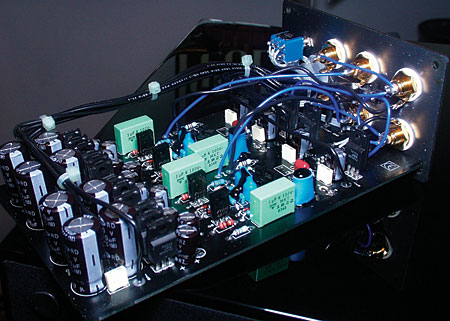
If I'm raving now—as I hope I rarely do in this column, if ever—it's because the Whest is so unlikely: physically small, inexpensive for what it does, and the product of the imagination and skill of a designer I'd never heard of. I had no expectations when I first plugged it in, and I've been listening to it using the extremely revealing Verity Audio Sarastro loudspeakers ($30,000/pair), which are equipped with Raven ribbon tweeters. I plan on revisiting the Whest after the 2005 CES because I need to spend more time than I've had to be sure that I'm not going over the deep end here.
I don't think I am. For now, the $2595 Whest PS.20 + MsU.20 is in my list of top 10 phono preamps. If you need more bloom and a richer picture, you can go to the superb-sounding BAT VK-P10 or the Zanden 1200 or the Conrad-Johnson Premier 15—all of which use tubes. The Manley Steelhead with stock tubes never sounded rich or bloomy to me, which is one reason I like it so much. The Whest sounded remarkably similar to the stock Steelhead, and costs a lot less.—Michael Fremer
Mikey took a second listen in June 2005 (Vol.28 No.6):
Fearing I'd gone overboard in my praise of the Whest PhonoStage.20 phono preamp ($2595) in my March column, I took a second listen—once the full-range, very revealing Wilson Audio MAXX2 loudspeakers had been installed in my system. While I stand by my praise of the Whest, it's not in the same league as the Boulder 2008 ($29,000)—or the Manley Steelhead ($7300), for that matter—though some overoptimistic souls have read that into what I wrote.
The Whest might not bowl you over when you first hear it. Unlike the Sutherland PhD ($3000), for instance, which immediately startles thanks to its exceptional liquidity, purity, and background quiet, the Whest's greatest strength is its overall balance. It does everything well, but nothing exceptionally so. The Whest also exhibits no obvious weaknesses—neither immediately nor over time. The PhD, on the other hand, noticeably trades some dynamic slam, and especially transient speed and detail, to achieve its mesmerizing flow. That's a tradeoff many happy PhD owners have been willing to make. You needn't switch out phono preamps to notice what the PhD does exceedingly well, or to hear its shortcomings. The Whest, on the other hand, lowers the performance bar evenly compared to far more expensive phono preamps and, in so doing, simply gets out of the way. More music, fewer audiophile jollies.
When I wrote my original review, I'd cracked open the Whest's main chassis, but not the case of its MsU.20 power supply. Now I have. Inside I found a high-quality toroidal transformer, but I also found that designer James Henriot had leveled the circuit board with a piece of folded-over cardboard. That's tacky. In fact, for $2595 it's downright amateurish. That shouldn't stop you from considering the Whest, though.—Michael Fremer
- Log in or register to post comments
